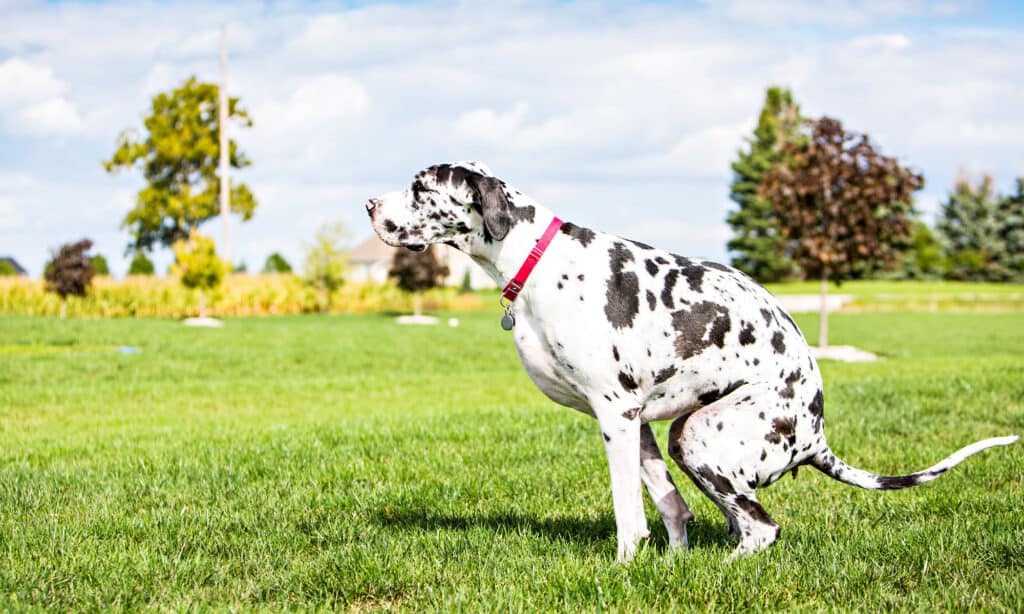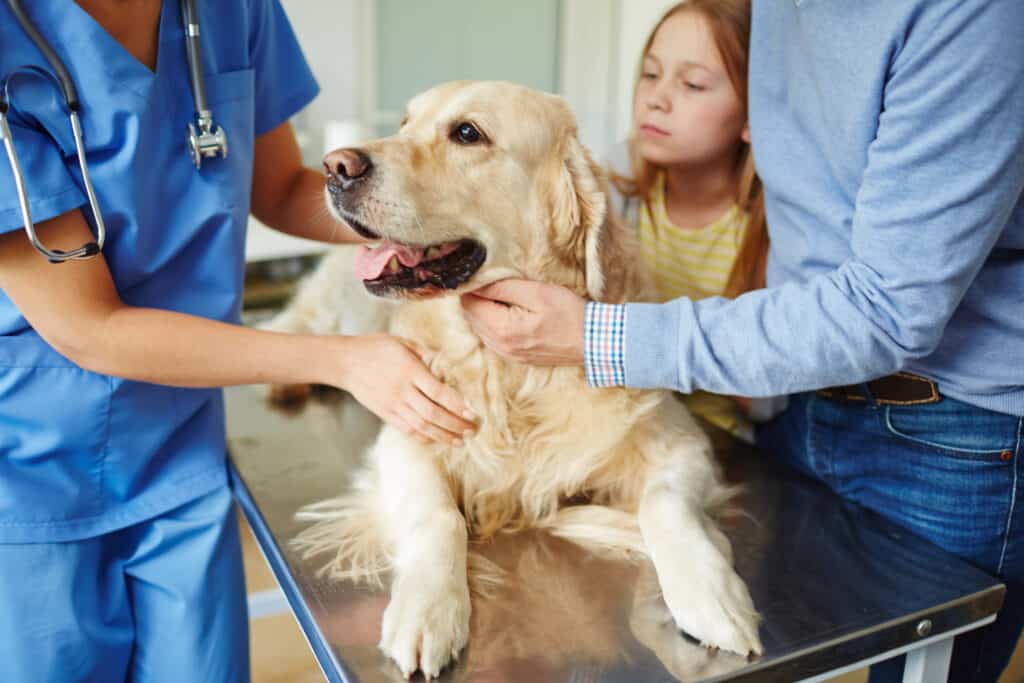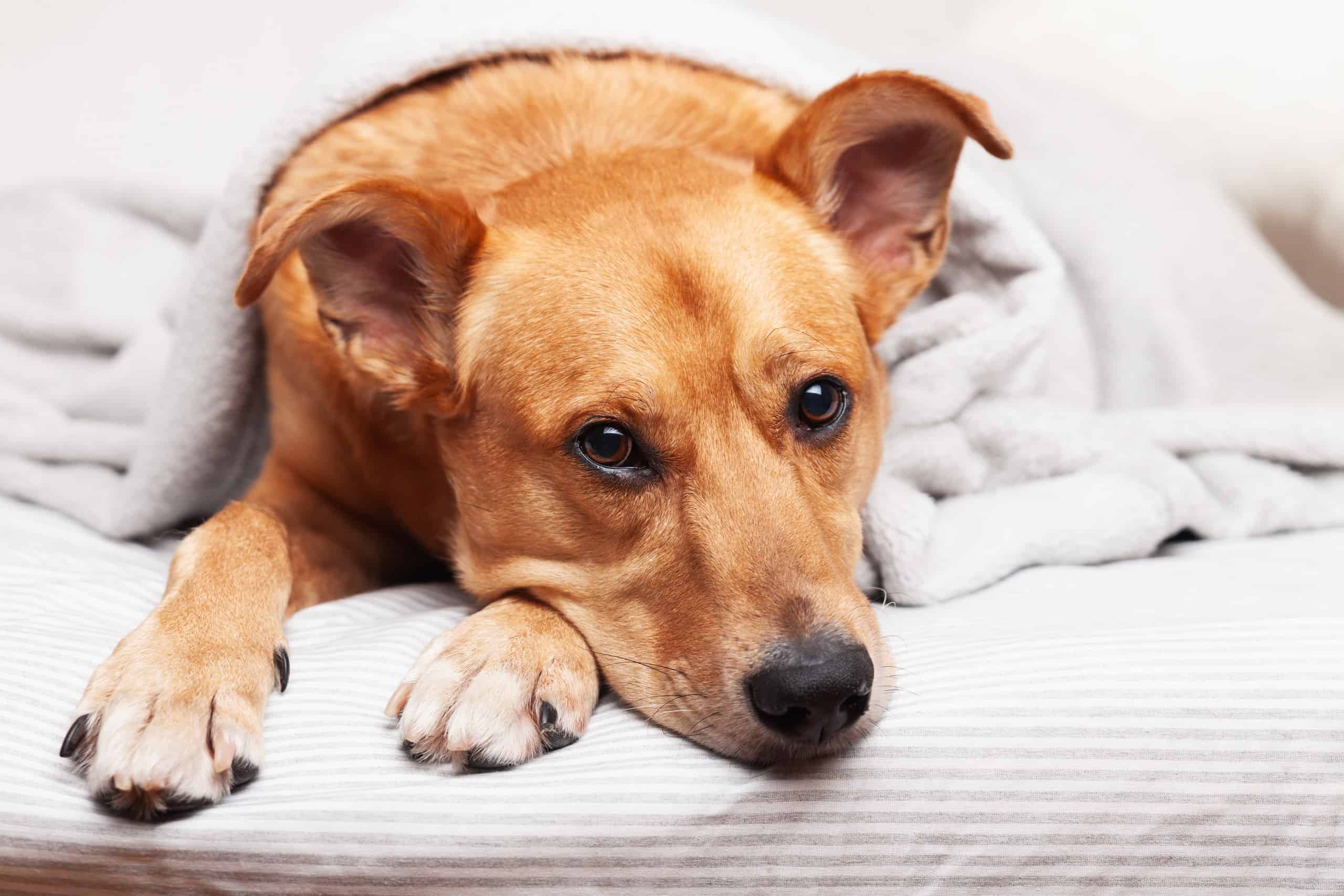Diarrhea is one of the most common medical complications seen in our canine companions. This is likely due to how easy it is to disturb the balance of gut bacteria. The many diarrhea triggers our pets can come in contact with each day are also factors.
Our pups can develop diarrhea due to everything from eating fatty human foods to coming in contact with bacteria in the soil. It’s important to be aware of the factors that can cause GI upset, since many of them are common.
We want to help you get to the bottom of your pup’s diarrhea, so let’s discuss the possible causes below. We will also dive into some of the best ways to help your little one with diarrhea!
What Is Considered Diarrhea in Dogs?

Healthy poop is typically chocolate brown in color, in a formed log shape, and easy to pick up.
©Victoria Rak/Shutterstock.com
Let’s first understand what constitutes diarrhea. In order to spot abnormal stool in your canine companion, you must first understand what is considered normal.
Healthy dog poop is typically chocolate brown in color, in a formed log shape, and easy to pick up. Many describe the ideal dog poop as having a playdoh consistency, yet still squishy enough to be passed with ease. If your dog’s poop is not formed or impossible to pick up, then she is experiencing soft stool or diarrhea.
Diarrhea in dogs can range in severity. This is why many veterinarians will ask you to describe your dog’s diarrhea to the best of your ability. Some of the most helpful comparisons include soft serve ice cream, pudding, and liquid.
Now that you can identify it your dog is having diarrhea, it’s time to break down the most common causes of GI upset in our furry friends. From dietary indiscretion to pesky parasites, we’ll discuss it all!
They Ate Something They Shouldn’t Have
The term “dietary indiscretion” refers to a dog that eats anything outside of their standard diet. This can refer to them eating items found in the trash, fatty human food, and even random items. Due to the fact that our dog’s digestive system is not used to foods outside of their standard diet, this can easily lead to a case of diarrhea. This is especially true if the food items they consume are high in fat. This substance is much more challenging for their bodies to break down.
They Had a Sudden Diet Change
Just as we mentioned above, your dog’s digestive system grows accustomed to his daily diet. Dogs also have a delicate balance of bacteria that inhabits the digestive systems. Additionally, GI flora lines the digestive tract. If your dog undergoes an abrupt diet change, this can throw off his delicate balance of gut bacteria. Sudden onset diarrhea may be the resulting symptom.
This does not mean you cannot change your dog’s diet. But you should transition them over to the new food over a two-week period. The best way to do this is by following the guidelines below:
- Days 1-4: 25% of the new diet and 75% of the old diet
- Days 5-9: 50% of the new diet and 50% of the old diet
- Days 10-13: 75% of the new diet and 25% of the old diet
- Day 14: 100% of the new diet
They Have a Bacterial Infection in Their Gut
Bacterial infections are another common cause of diarrhea in our canine friends. Bacteria can be found everywhere in the world around us, and often in areas that our dogs come in contact with. Your dog can be exposed to bacteria that exists naturally in the soil. Bacteria can also develop in water bowls or food that’s been sitting out too long. If your pup comes in contact with any of these microscopic invaders and consumes them, this can quickly lead to a bacterial infection in her digestive system.
They Have Intestinal Parasites & Protozoa
Just as bacteria exists everywhere in the world, so do intestinal parasites. Intestinal parasites that invade a dog’s digestive tract can be found in the soil in our yard, in infected fleas, and even in sitting water. If your pup is not on a monthly heartworm prevention that contains deworming agents, this can cause her to develop a nasty parasitic infection. We always suggest keeping your dog on a monthly heartworm prevention that includes deworming agents. You should also give your dog flea and tick prevention once a month, and have your pup dewormed once yearly.
They Caught an Infectious Illness
Unfortunately for our beloved pups, they can be exposed to infectious illnesses that lead to serious GI upset. These contagious diseases most commonly impact young dogs and puppies, as their immune systems are not as strong as those of their older canine friends. Most infectious illnesses that cause GI upset can be prevented by making sure your pup is fully vaccinated. A typical vaccination plan includes a series of three vaccines that are given three to four weeks apart. These start at around eight weeks of age. Your furry friend should also get yearly vaccines for the rest of her life.
If you have questions about the best vaccination plan for your dog, call your veterinarian for assistance. Individual cases will vary based on the dog’s age and general health. We always suggest seeking guidance from your vet directly.
They Have an Underlying Health Condition
Diarrhea in dogs can sometimes be a result of an underlying chronic illness. Some of these conditions can impact the digestive system specifically. They can also lead to GI upset that causes a change in stool. However, most of these complications will also lead to other concerning symptoms as well.
Some of these symptoms include a change in appetite, weight changes, lethargy, disinterest in activities they typically enjoy, weakness, coat changes, and shifts in their behavior. If you think this might be the case for your dog, visit your veterinarian as soon as possible.
Can You Treat a Dog’s Diarrhea at Home?
If your dog is experiencing a case of diarrhea, you might be wondering if you can treat him at home. Home care is possible, but you need to make sure the situation is minor enough to allow it. To know whether or not you can resolve the problem at home, review the following do’s and don’ts.
You can begin home care for your dog’s diarrhea (with vet approval) if:
- He is over one year of age.
- He does not have any known health conditions.
- He has had diarrhea for less than 48 hours.
- He has a normal appetite.
- He is not vomiting.
- He is not experiencing any lethargy or weakness.
You should pass on home care and go to your vet instead if:
- She is a puppy.
- She has any other signs of GI upset like vomiting, decreased appetite, lethargy, or abdominal pain.
- She has had diarrhea for more than 48 hours.
- She has underlying health conditions.
Always reach out to your vet first, as they may have other guidance based on your dog’s medical history.
Temporary Fasting to Help Their Stomach Settle
If you think the diarrhea is a result of something he ate, you can fast him for 12 hours. This will allow his digestive system to rest. Sometimes a dog’s GI system can be in overdrive during episodes of diarrhea. A short fasting period can allow things to slow down.
You can only do this with healthy adult dogs that do not have any underlying health conditions. Fasting can be dangerous for puppies and elderly canines. Once you introduce food again 12 hours later, be sure to offer them a bland diet.
Offer Them a Bland Diet For 5-7 Days
If your dog is experiencing a mild case of diarrhea, then offering her a bland diet for five to seven days can be beneficial. Your vet will likely recommend this too.
The standard bland diet option that vets recommend is boiled chicken breast and white rice. You can also use boiled ground turkey or any other lean protein. If your dog has protein allergies and you are not sure what would work best, your vet can guide you.
When to Take a Dog with Diarrhea to the Vet

Your dog should always be seen by a veterinarian if diarrhea lasts for more than 48 hours.
©iStock.com/shironosov
If your dog has a bad case of diarrhea, you may be wondering when to have her checked out. We want to make sure your pup gets the help she needs. We’ll offer some tips to help you determine when your poopy pup needs vet care.
No matter the potential cause of your dog’s diarrhea, you should have her assessed by a vet if it lasts longer than 48 hours. Diarrhea that lasts this long can lead to dehydration in your fur baby. This often requires some form of medical care to resolve properly. Vet care is especially important if your dog is also vomiting or has a decreased appetite. These factors increase the risk of dehydration even more.
In addition to the 48-hour rule and the presence of other GI symptoms, we suggest taking your dog to the vet if he is a puppy, elderly, or if he has chronic medical conditions. These babes are more at risk of life-threatening dehydration and serious health complications. Have them assessed as soon as possible when diarrhea develops.
Final Thoughts
Though doggy diarrhea can be due to benign factors, it can also be the result of serious underlying medical conditions. Review the potential causes discussed above, and you will get to the bottom of your dog’s diarrhea in no time! And remember, contacting your vet is always the safest bet.
Ready to discover the top 10 cutest dog breeds in the entire world?
How about the fastest dogs, the largest dogs and those that are -- quite frankly -- just the kindest dogs on the planet? Each day, AZ Animals sends out lists just like this to our thousands of email subscribers. And the best part? It's FREE. Join today by entering your email below.
Thank you for reading! Have some feedback for us? Contact the AZ Animals editorial team.








